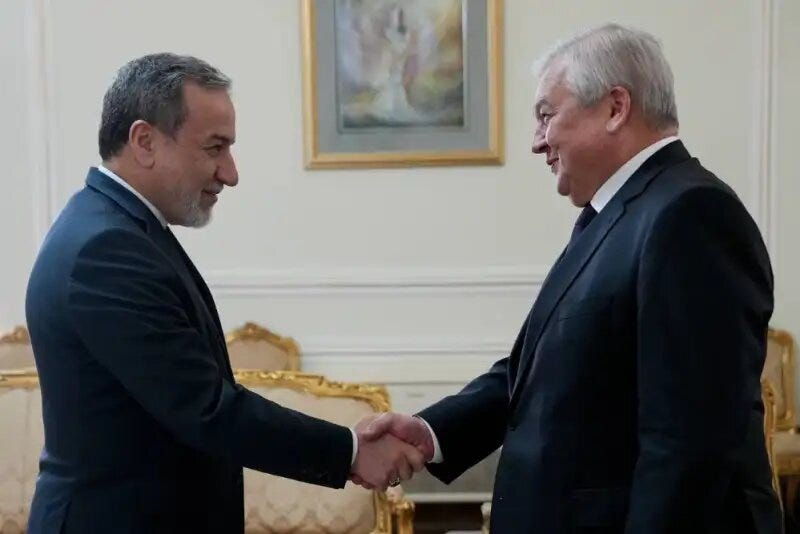Iran-Russia Reaffirm Strategic Ties, Reject Exploitation of Nuclear Deal
Tehran and Moscow underscore unity on Syria’s sovereignty, vow to resist Western pressure and illegal sanctions
Iran, PUREWILAYAH.COM – Iran and Russia have reiterated their strategic partnership and shared opposition to Western interference, stressing their unified stance on preserving Syria’s sovereignty and rejecting any attempts to exploit the nuclear deal to reimpose sanctions on Tehran.
The affirmation came during a meeting between Iran’s Foreign Minister Abbas Araghchi and Alexander Lavrentiev, the Special Representative of the Russian President for Syria, held in Tehran on Monday.
Joint Stand Against Political Exploitation of the Nuclear Deal
During the talks, Minister Araghchi expressed appreciation for Russia’s “firm and principled” position at the UN Security Council, particularly its opposition to attempts by Western states to misuse the JCPOA’s dispute resolution mechanism as a tool for reviving expired resolutions related to Iran’s nuclear program.
Araghchi emphasized that such manipulations are “illegal and politically motivated,” undermining both international law and the trust necessary for diplomatic engagement.
Lavrentiev, for his part, reaffirmed Moscow’s commitment to deepening strategic coordination with Tehran, noting that Iran and Russia share a “common understanding” on major global and regional developments.
“Our partnership is based on principles, not pressure,” Lavrentiev said, highlighting that sustained dialogue between Tehran and Moscow remains essential for regional stability and multipolar cooperation.
Unity on Syria’s Sovereignty and Regional Integrity
Both sides underscored their joint position on Syria, emphasizing the need to safeguard the country’s sovereignty, territorial integrity, and unity in the face of ongoing Western and Israeli aggression.
They also called for preventing Syria from becoming a hub for terrorism, reiterating that external interference and occupation forces remain the primary obstacles to peace and reconstruction.
Tehran and Moscow pledged to continue high-level consultations on Syria and other regional files, asserting that any resolution must respect the will of the Syrian people and uphold the principles of international law.
Tehran Expands Coordination Against Western Coercion
As Western capitals intensify economic and political pressure, Iran is increasingly strengthening its partnerships with Russia, China, and members of the Non-Aligned Movement (NAM) to counter what it describes as illegal coercive policies.
Araghchi confirmed that these countries are coordinating closely to “neutralize the European Union’s unilateral actions” and to defend authentic multilateralism against Western domination.
The NAM’s Kampala communiqué echoed Tehran’s position, affirming that UN Security Council Resolution 2231 remains valid and binding, and that all nuclear-related restrictions must be fully lifted in accordance with the October 18 deadline set under the nuclear accord.
Strengthening Iran’s Domestic and Economic Resilience
On the domestic front, Deputy Foreign Minister Hamid Ghanbari announced that Iran has adopted an “active economic response” strategy to mitigate the impact of sanctions and reinforce internal strength.
“If the domestic economy is strong, Iran will have the upper hand at the negotiating table,”
Ghanbari stated, emphasizing the importance of building economic self-sufficiency and strategic resilience.
Tehran’s new policy focuses on diversifying trade partnerships, expanding regional networks, and shielding the livelihoods of its citizens from the effects of external pressure — a strategy aligning with Iran’s broader doctrine of resistance economics.
A Strategic Axis of Independence
The renewed coordination between Tehran and Moscow highlights a wider geopolitical shift toward cooperation among independent states resisting Western hegemony.
By consolidating strategic ties, Iran and Russia are reinforcing a multipolar global order built on sovereignty, equality, and mutual respect, standing in direct contrast to the unilateralism of the United States and its allies. (PW)


